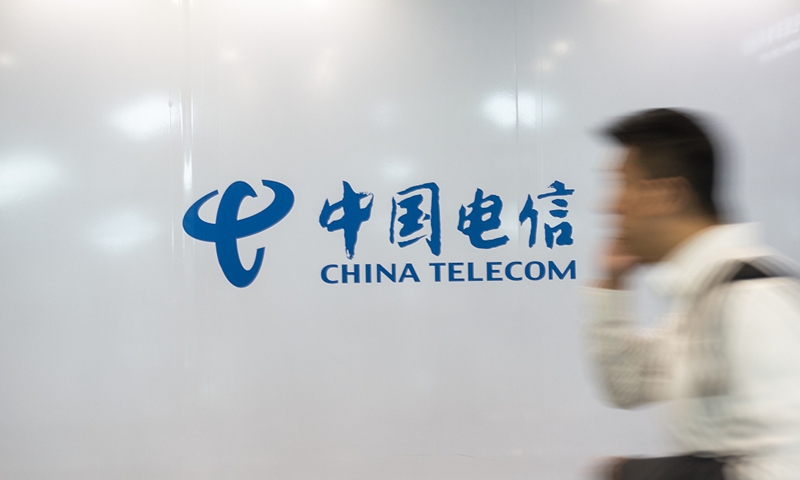
China Telecom Photo:CFP
China’s major telecom operators are increasing the proportion of servers they buy that are powered by domestic chips, a move that experts said reflects their concerns about potential risks in China-US relations. It also shows that domestic chip technologies are quickly maturing, fueled by rising market demand.
The country’s three major telecommunications operators have all disclosed the results of their latest server bid. Of the first batch of portable computer servers ordered by China Mobile in the 2021-2022 period, about 27 percent are powered by domestic chips, namely Huawei’s Kunpeng and chips made by Chinese tech giant Hygon.
This shows a rising proportion of domestic servers in the telecom giant’s purchasing layout, as PC servers powered by domestic chips only accounted for about 20 percent of the company’s overall PC server orders in 2020.
China Telecom ordered 53,401 servers powered by domestic chips for the 2022-2023 period, according to a statement they published recently. This is a significant increase from the 24,823 domestic servers they purchased in the 2020-21 period. However, the proportion has dropped somewhat to 26.7 percent from 35.5 percent.
China Unicom also purchased a large number of artificial intelligence (AI) servers powered by domestic chips, mostly Huawei Shengteng chips, in their 2022 bid. Domestic AI servers account for about 33.3 percent of their overall purchasing.
Experts attributed this phenomenon to the fact that domestic telecom companies are feeling increasingly insecure about relying on overseas servers after many Western countries showed an increasingly hostile attitude toward China, and high technology is one of the areas that is most vulnerable to external sanctions.
“China-US relations have become complicated, so companies are looking to multiply their purchasing channels in order to reduce risks,” Fu Liang, a veteran TMT analyst, told the Global Times on Monday.
Domestic chip technologies are also maturing rapidly, and Chinese companies are capable of replacing a certain portion of overseas chips.
According to Fu, China’s chip design has attained a medium- or high-level standard compared with overseas companies. Product research and development is progressing, while software has also reached a high level, he said, adding that the bottleneck now mostly lies in the manufacturing side.
Even the problem with chip manufacturing is also on the verge of being solved, thanks to the collective efforts from government and market resources in recent years, experts said. For one thing, China’s rapid surge of demand for terminal electronic products has been stimulating progress in upstream technologies, and much progress has already been made in manufacturing of certain chips, such as those used for industrial controllers and home electric appliances. The whole chip industrial chain is developing, which creates a positive environment for technological breakthroughs.
“A batch of companies are doing business related to chip industrial chains, and this collective force makes it easier to make breakthroughs in critical areas, like high-end chip manufacturing,” Fu said.
Tech analyst Xiang Ligang said that one problem with domestic server supplies is that they are not stable enough, as the US sanctions on Huawei also restricted their production of Kunpeng chips. “Currently, they might be selling previous stock, but I guess there is not much inventory left,” Xiang told the Global Times.
But Xiang is also optimistic that China’s chip production technologies will see breakthroughs in the next few years, and once that happens, the proportion of domestic servers are likely to increase further in Chinese clients’ supplier list.
